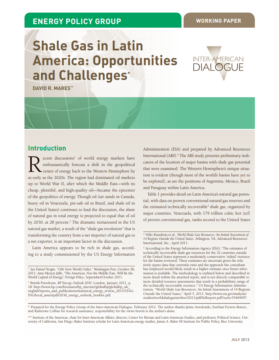Is the US Likely to Engage with Cuba on Offshore Drilling?
Will Cuba be able to safely regulate its oil industry?
The development of energy resources is an integral component of many of Latin America’s economies, from established producers like Colombia and Brazil to newcomers to the global energy market like freshly oil-rich Guyana. However, policymakers and energy companies throughout the region must devise solutions to a variety of fiscal, political, social, and environmental hurdles to ensure successful and sustainable projects, explained speakers at an Inter-American Dialogue event on May 10.
Two of Colombia’s top energy officials—Diego Mesa, vice minister of energy, and Luis Miguel Morelli, president of the National Hydrocarbons Agency (ANH)—described some of the steps the government of President Iván Duque has taken to court investment in exploration and production and boost Colombia’s oil and gas reserves, which have dwindled to six and twelve years, respectively. Morelli underscored the signing of the first new E&P contracts in five years as evidence of the success of the Duque government’s measures, which include VAT exemptions for capital investment, a reduction of the corporate income tax, changes to the offshore E&P model contract, and a shift from bid rounds to a permanent bidding process in which a company may make an offer for any block of available area, at which point other companies are invited to make counter-offers. In the coming weeks, the government will also announce its plans for pilot projects in unconventional oil and gas development (“fracking”), acting on the recommendations made by an expert committee earlier this year. According to Mesa, this could be a game-changer, tripling or quadrupling oil and gas reserves.
[caption id="attachment_82694" align="alignleft" width="359"] Luis Miguel Morelli, president of Colombia's National Hydrocarbons Agency (ANH)[/caption]
Luis Miguel Morelli, president of Colombia's National Hydrocarbons Agency (ANH)[/caption]
The government is also taking steps to reduce environmental licensing delays by cutting the number of processes required for environmental licensing, and to try to mitigate local opposition by proposing changes in royalty distribution. Through a constitutional change the government seeks to increase the share of royalties paid to producing regions from 20% currently to 30-50%. A court ruling in October determined that local communities no longer have veto power through the consulta previa process, as subsoil resources belong to the whole nation, but companies must still “coordinate and concur” with communities.
Such engagement with communities was a central theme in the discussion of a second panel on above-ground challenges to resource development throughout the region. David Mares, distinguished professor of political science at the University of California San Diego, stressed that following legal protocols is not enough to ensure the long-term success of energy projects, noting that in Peru, although communities have no veto power, their blocking of roads in protest has halted major projects. Citizens must reap concrete benefits from projects, not just in terms of national GDP growth, but in their communities, in order to grant the consent that companies require to operate. Julie Evans, environmental and social manager for the Americas at RINA Consulting, added that monitoring and managing expectations is also key, recounting a recent trip to Guyana on which she met with local indigenous groups, NGOs, and government officials that expected the impending flood of oil investment to create many thousands of jobs—a misconception that, uncorrected, will create social risk for companies when it proves false.
[caption id="attachment_82697" align="alignright" width="359"] L to R: Lisa Viscidi (Inter-American Dialogue), Julie Evans (RINA Consulting), Lenin Balza (IDB), David Mares (UC San Diego)[/caption]
L to R: Lisa Viscidi (Inter-American Dialogue), Julie Evans (RINA Consulting), Lenin Balza (IDB), David Mares (UC San Diego)[/caption]
In Guyana, a lack of institutional preparation for a surge of revenue ($8-12 billion over 20 years from the Liza-1 well alone) also presents a major threat to stability. Lenin Balza, an economist within the extractive sector initiative at the Inter-American Development Bank (IDB), explained the work being done to build institutional capacity for the nation’s oil sector, whose sole relevant guideline until recently was a skeletal petroleum law written in 1986. The creation of the Department of Energy last August and approval in January of a sovereign wealth fund to manage revenue flows were important steps, and the IDB and other donors are working closely with the government to construct vital elements, such as previously nonexistent protocols for managing the country’s production-sharing agreements with companies.
The risks associated with developing energy resources in the Americas are considerable. But for governments and companies that are prepared to smartly engage with one another and with other stakeholders to create fiscal, environmental, and social mechanisms that maximize the benefits for all in the long-term, Latin America’s natural resources represent a boon.
[embed]https://youtu.be/_EoTy_kYKfs?t=168[/embed]
Will Cuba be able to safely regulate its oil industry?
Unless resource nationalism can be made compatible with providing incentives for significant foreign participation, it may be too early to start trumpeting a bonanza for Latin America.
Despite its prodigious petroleum reserves, many countries in Latin America are experiencing declining production. What explains the paradox?
 Diego Mesa, vice minister of energy of Colombia. Photo credit: Sofia Lalinde / Inter-American Dialogue
Diego Mesa, vice minister of energy of Colombia. Photo credit: Sofia Lalinde / Inter-American Dialogue

